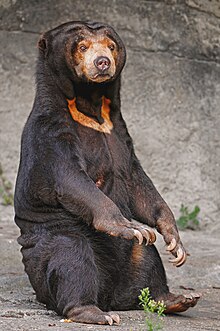The Malayan sun bear (Helarctos malayanus malayanus) is a subspecies of sun bear, occurring in southeast Asia.[1]
| Malayan sun bear | |
|---|---|

| |
| A female Malayan sun bear sitting in her enclosure of zoo Basel | |
| Scientific classification | |
| Domain: | Eukaryota |
| Kingdom: | Animalia |
| Phylum: | Chordata |
| Class: | Mammalia |
| Order: | Carnivora |
| Family: | Ursidae |
| Genus: | Helarctos |
| Species: | |
| Subspecies: | H. m. malayanus
|
| Trinomial name | |
| Helarctos malayanus malayanus (Raffles, 1821)
| |
Taxonomy
editThe Malayan sun bear was first described by Stamford Raffles in 1821.[2] The Malayan sun can be found across Malaysia.[citation needed]
Description
editAlthough the sun bear is the smallest species in the bear family, its subspecies, the Malayan sun bear is even smaller, with a maximum length of 1.5 m (4 ft 11 in) and weight of 35–70 kg (77–154 lb).[2] The Malayan sun bear appears very similar to the sun bear, but is distinguishable by its golden-white chest patch, which is thinner than that of the sun bear.[3]
Distribution and habitat
editThe Malayan sun bear can be found in mainly coastal areas in southeast Asia, but is less dispersed within it than the sun bear, with specific populations living as follows:[1]
- Along the India–Myanmar border
- Western peninsular Malaysia
- Western Sumatra
- Inland Borneo
- Inland Indochina
Like the sun bear, the Malayan sun bear lives within rainforests (both evergreen and deciduous) of diverse altitudes, ranging from coastal, lowland areas to mountainous regions of above 2,000 m (6,600 ft).[2]
Ecology and behavior
editThis section needs expansion. You can help by adding to it. (November 2023) |
Unlike the sun bear, the Malayan sun bear is primarily nocturnal, although it is also active in the daytime.[3] However, equally to the sun bear, they do not hibernate like other bears due to their warm, tropical environment, which provides nutrients all year round.[3]
Diet
editSimilarly to the sun bear, the Malayan sun bear is omnivorous and eats fruit, honey, and nuts.[4] The meat in their diet is composed of insects such as termites, bee larvae and beetle larvae.[2] They can reach these foods with their long tongues (which can reach 30 cm (1 ft)) and claws.[5]
References
edit- ^ a b "Malayan Sun Bear". Saint Louis Zoo. Retrieved 2023-11-01.
- ^ a b c d "Malayan sun bear". Bear Conservation. 18 February 2021. Retrieved 2023-11-14.
- ^ a b c "Malayan Sun Bear". Malaysian Wildlife. Retrieved 2023-11-01.
- ^ "Malayan sun bear at Belfast Zoo". Belfast Zoo. Retrieved 2023-11-10.
- ^ "Malayan Sun Bear". Saint Louis Zoo. Retrieved 2023-11-12.
- Wilson, D. E.; Reeder, D. M., eds. (2005). "Helarctos malayanus malayanus". Mammal Species of the World: A Taxonomic and Geographic Reference (3rd ed.). Johns Hopkins University Press. ISBN 978-0-8018-8221-0. OCLC 62265494.